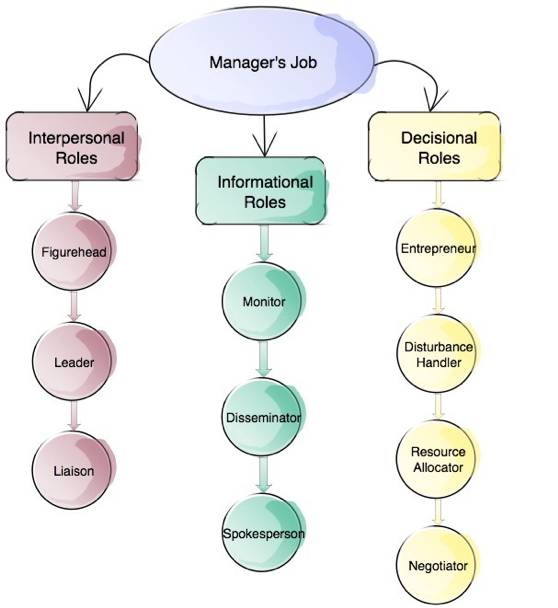
The Manager’s Roles as Defined by Henry Mintzberg
There are many management theories. However, Henry Mintzberg was one of the few researchers who succeeded to convey the manager’s daily roles in a variety of sectors and positions. Mintzberg proposed in his research and particularly in his two books: “The Nature of Managerial Work” (1973) and “Inside our Strange World of Organizations” (1989), that a manager must play ten diverse roles switching between them whenever it is needed. The ten roles as per Mintzberg (1973) are: “figurehead, leader, liaison, monitor, disseminator, spokesperson, entrepreneur, disturbance handler, resource allocator, and negotiator”. These different roles were also divided into three main categories: “interpersonal, informational, and decisional”. These 10 roles reflect the complexity of the managerial position, where any given manager has many duties vis-à-vis his organization, his subordinates, his superiors, the shareholders, and the stakeholders.
1- A brief historical review about the development of management concepts:
Historically, studies related to management have passed through three eras. The first era was before the industrial revolution, between 1820 and 1840, where management activities were restricted to the owners who had rigorous control over all the resources. However, this primitive management practice contained some similarities with today’s management roles such as coordinating, planning, and controlling. The second period started within the industrial revolution where the comprehensive theories and functions of management such as planning, organizing, commanding, coordinating, and controlling appeared especially with Henri Fayol (1916). Afterwards, and once the industrial revolution era had ended, the second industrial revolution started. This new epoch is also known as the technological revolution as it was a stage of fast standardization and automation reaching the early 20th century. Out of many researchers in this period, Professor Henry Mintzberg piloted a thorough experiential research about managers’ regular activities through a large variety of organisations and positions. Mintzberg (1973) recommended managers to play a selection of ten roles divided into three main categories based on situational needs as shown in the below image (1).

Image (1) source: ("Mintzberg Model: 10 Different Roles of a Successful Manager", 2020)
2- The different manager’s roles as per Mintzberg (1973):
Mintzberg’s managerial theory is founded on the idea that managers are involved in ten roles, divided into three main clusters: interpersonal, informational, and decisional. Furthermore, Henry Mintzberg defines the operating effort of managers in each role. The behaviours of those managers are crucial components for their success. Of course, the ten roles are inspired by personal and situational considerations.
A) Interpersonal cluster includes:
1- Figurehead role, where a manager plays officially the role of a professional representing his organization in social activities and events.
2- The second role is leadership. This role is related to people’s motivation and inspiration. As a leader, a manager must coach, support, and guide his/her subordinates.
3- The last role requested from a manager in the interpersonal cluster is to be a liaison and to build contacts with all stakeholders. Managers should oversee networking even beyond their organization boundary.
B) Informational cluster includes also very critical roles. Based on these roles, the manager is supposed to communicate, monitor, manage, and distribute the information at all levels. Therefore, the detailed roles in this cluster are the following:
4- Monitor: managers should ask for information inside and outside the workplace. This will help them to evaluate their department from internal and external viewpoints, discover related problems, and address them in due time.
5- Disseminator: managers must delegate more when it is appropriate and convey important information especially to their employees.
6- Spokesperson: as a manager one ought to transmit information outside the workplace taking the role of a brand ambassador.
C) Decisional part encompasses the following roles:
7- Entrepreneur: behaving as an entrepreneur, managers should encourage change and creativity by leading the implementation of new ideas.
8- Disturbance-handler: managers are responsible for avoiding any disruptions that can prevent achieving the needed outcomes.
9- Resource-allocator: managers need to assign and administer a variety of financial, technological, and human resources activities.
10- Negotiator: surely a manager is responsible to carry out important negotiations within his department and organization.
In a nutshell, a successful manager knows when to play every role separately or a combination of roles to achieve success. The manager’s profession can be defined as playing several roles or planned sets of actions linked to his position (Mintzberg, 1975). However, with time and after the learning organization concept by Garvin et al (2008) was well recognized, a manager’s role evolved, and it needs a new set of skills to empower employees to achieve their goals as well as the organizational goals. Managers need to focus on goals, relations, and participation (Yukl, 2001). To do so, a manager needs to play more the leadership role to inspire people and share with them the necessary information to work together as a team, cooperate, and learn from each other.
Managers are always comfortable in their organizational setting. However, they can always benefit themselves as well as their employees from adopting positive change, training, and development. The roles of managers as defined by Mintzberg are considered essential guidelines for good managers, though, adding new skills and competencies can always uplift a manager to a higher level. A level of exploration and people understanding that helps in improving the overall performance of the organization.If you are interested in learning more about leadership and management, check out our Certified Leadership and Management courses.
Related Articles

Certified for Success: Why Global Credentials Matter More Than Ever
Let us face it: todays business world does not slow down for anyone.

The Imperative of Upskilling and Reskilling
In an era of relentless technological advancement, economic volatility,…

Should HR Professionals Embrace AI Fully?
In the fast-changing tempo of businesses today, AI is no longer a thing…

Developing Leadership Presence
Leadership presence is a crucial aspect that sets exceptional leaders…
